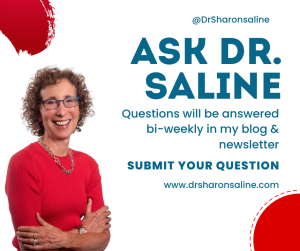How do I get my child properly evaluated and diagnosed for ADHD?
 Dear Dr. Saline, My son is now a junior in high school and is having trouble with the increased workload. I suspect something may be wrong. Where do I start with the process of getting him evaluated and diagnosed for ADHD? Sign-up for my newsletter + Free Handout | Ask Dr. Saline
Dear Dr. Saline, My son is now a junior in high school and is having trouble with the increased workload. I suspect something may be wrong. Where do I start with the process of getting him evaluated and diagnosed for ADHD? Sign-up for my newsletter + Free Handout | Ask Dr. Saline
From Dr. Saline
For children and teens up to age 18, receiving an accurate diagnosis of ADHD can be a complicated, confusing, and frustrating experience. Often parents receive contradictory or inadequate information about the process, and navigating the maze toward diagnosis and treatment can be perplexing. In particular, the tween and teen years are development stages when trouble with attention, organization, and distractibility come to the forefront. As kids switch classes, confront more complex academic work, cope with social dynamics and pursue extracurricular activities, their lives demand that they develop and apply more sophisticated executive functioning skills. So it’s common to see challenges, anxiety, and even depression when they struggle to keep up. Typically, there are three ways to obtain a diagnosis of ADHD; quite honestly, TikTok is not one of those paths. While social media may alert your adolescent that some of their difficulties might meet the criteria for ADHD, it is not a reliable source of a diagnosis.
Evaluator Options Include:
- Primary care providers (nurse practitioners, pediatricians, physician assistants)
- Mental health professionals (including psychiatrists) and
- Using school resources
Whichever route you choose, ensure the person understands and has significant experience with ADHD. This person will conduct a thorough individual and family history with you and your child. Then, let’s look at a few options.
Private Professional Options
1. Primary Care Providers
 If your child’s issues might be related to attention, you may have already started researching ADHD. Start by talking with your primary care provider or pediatrician because they have likely known your child for years and have been advising you all along. They will probably give you some forms to fill out with rating scales (and take you to the school) to get a sense of daily functioning and trouble spots and talk with each of you about behavioral, emotional, and cognitive issues. If the forms indicate ADHD, they may refer you for counseling, coaching, or a psychoeducational evaluation (private or through the school district), discuss medication options with you or give you the name of a local psychiatrist.
If your child’s issues might be related to attention, you may have already started researching ADHD. Start by talking with your primary care provider or pediatrician because they have likely known your child for years and have been advising you all along. They will probably give you some forms to fill out with rating scales (and take you to the school) to get a sense of daily functioning and trouble spots and talk with each of you about behavioral, emotional, and cognitive issues. If the forms indicate ADHD, they may refer you for counseling, coaching, or a psychoeducational evaluation (private or through the school district), discuss medication options with you or give you the name of a local psychiatrist.
2. Mental Health Professionals
 Whether your child or teen is already in therapy or has just been referred, your licensed counselor, social worker, or therapist will want to assess their primary concerns and symptoms to determine a diagnosis and create a treatment plan. Like your pediatrician, this provider will usually show a thorough developmental and family history and give you forms similar to the ones the pediatrician uses before making a diagnosis. Often, they will consult with your pediatrician, your child’s classroom teachers, and other school personnel. Suppose the therapist or psychiatrist has additional concerns or thinks more data is warranted. In that case, they may also recommend ‘testing,’ especially to rule out any learning issues or for clarification of what’s going on. Some psychiatrists offer therapy in addition to prescribing medication, and others only focus on medication management. All of these folks are capable of diagnosing ADHD.
Whether your child or teen is already in therapy or has just been referred, your licensed counselor, social worker, or therapist will want to assess their primary concerns and symptoms to determine a diagnosis and create a treatment plan. Like your pediatrician, this provider will usually show a thorough developmental and family history and give you forms similar to the ones the pediatrician uses before making a diagnosis. Often, they will consult with your pediatrician, your child’s classroom teachers, and other school personnel. Suppose the therapist or psychiatrist has additional concerns or thinks more data is warranted. In that case, they may also recommend ‘testing,’ especially to rule out any learning issues or for clarification of what’s going on. Some psychiatrists offer therapy in addition to prescribing medication, and others only focus on medication management. All of these folks are capable of diagnosing ADHD.
Formal Psychoeducational Evaluations
Psychologists and neuropsychologists are trained to do formal psychoeducational evaluations (e.g., testing). Speech and language pathologists (SLP) and special education teachers can conduct more minor, specific tests. These evaluations include assessments of cognitive functioning (including verbal, visual-motor, working memory, and processing speed), other visual, verbal, math, and written skills, grade-level competencies, and emotional issues. These evaluations can be highly informative to you and your teen because they provide a glimpse into your child’s brain works, strengths, and challenges. When you choose a private evaluation (as opposed to testing through the school), you have more control over the person who does it. But ensure the evaluator takes the necessary time to explain the results thoroughly. These reports can be dense, confusing, and overwhelming. Ask all your questions and request a follow-up meeting if you need it.
School Resources and ADHD Evaluations
 Many parents first learn about their child’s challenges with concentration and focus from a classroom teacher, school counselor, or principal. While these conversations can be painful, the information educators share is essential to why your child is struggling in school. Understand that public schools in the USA can name attention, concentration, and memory issues, but they cannot legally diagnose ADHD since it is considered a health issue. However, they are mandated under IDEA (Individuals with Disabilities Education Act) to assess students for possible learning disabilities, including ADHD, and, if there are conditions that interfere with learning, to provide accommodations.
Many parents first learn about their child’s challenges with concentration and focus from a classroom teacher, school counselor, or principal. While these conversations can be painful, the information educators share is essential to why your child is struggling in school. Understand that public schools in the USA can name attention, concentration, and memory issues, but they cannot legally diagnose ADHD since it is considered a health issue. However, they are mandated under IDEA (Individuals with Disabilities Education Act) to assess students for possible learning disabilities, including ADHD, and, if there are conditions that interfere with learning, to provide accommodations.
How to Start the ADHD Evaluation Process
1. Begin with a parent meeting with a guidance counselor or vice principal who knows your child. 2. Discuss your concerns and see what they advise. Often, they might suggest that teachers make some minor changes in the classroom. If those are not satisfactory or you believe your child needs more support, then you have the right to request a formal evaluation, including a team meeting. This request can be made at the school or the district office. 3. What typically follows is the beginning of a thorough evaluation that is similar to private ‘testing’ but may also include additional information about speech and language skills and occupational functioning. These are similar to private ‘testing’ because they offer rich information about your child and the additional benefit of direct contact with their educational environment. However, some school districts prefer to do their evaluations but may need to wait longer than you want. 4. You also have the right to present your report. Schools can’t diagnose ADHD because it is a health disorder. You will need to share the information with your primary care provider, psychiatrist, or mental health professional to get an official diagnosis. 5. Next, a team meeting will be convened to determine the type(s) of special needs your child may have and whether they are eligible for mandated services. If your youngster qualifies, then the team will make recommendations and create an IEP plan or design the 504 at a later time.
In Conclusion
Many kids with ADHD also have reading, writing, or math difficulties which qualify as learning disabilities. Schools can diagnose these issues. Moreover, if they are blocking academic progress, support services will be provided. You can see how complex this process can be. Take a deep breath, and stick to what you know is true about your child. Don’t get intimidated by anyone who may dismiss your concerns. Trust your instincts, and realize that you know your kiddo better than anyone else. Collaborate on creating a plan that offers the help your student needs. Stay curious, ask questions, listen with an open mind, know your rights and advocate fiercely. If you need more support, seek it out. You’ve got this!
Want to ask Dr. Saline a question? Click Here
Become A Member
Please become a member of my newsletter community. You can find support and resources and connect with a group that understands your questions and needs. Click here Follow me on social media: YouTube, Facebook, Twitter, and Instagram. Invite Me to Speak | Join A Group | Newsletter | Read my blog
Sign-up for my newsletter today and receive 10% off!

